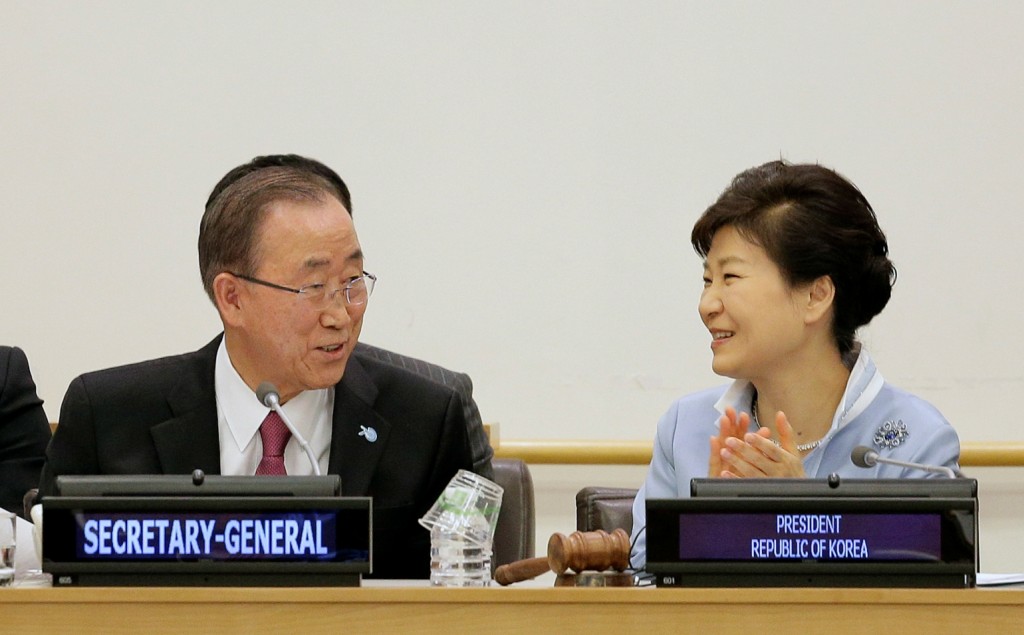- California Assembly OKs highest minimum wage in nation
- S. Korea unveils first graphic cigarette warnings
- US joins with South Korea, Japan in bid to deter North Korea
- LPGA golfer Chun In-gee finally back in action
- S. Korea won’t be top seed in final World Cup qualification round
- US men’s soccer misses 2nd straight Olympics
- US back on track in qualifying with 4-0 win over Guatemala
- High-intensity workout injuries spawn cottage industry
- CDC expands range of Zika mosquitoes into parts of Northeast
- Who knew? ‘The Walking Dead’ is helping families connect
S. Korea to donate US$200 million in aid to poor countries

United Nations Secretary General Ban Ki-moon, left, talks with South Korea president Park Geun-hye during a conference on A New Rural Development Paradigm and the Inclusive Sustainable New Communities Model, Saturday, Sept. 26, 2015, at the United Nations headquarters. (AP Photo/Julie Jacobson)
By Kim Kwang-tae
NEW YORK, Sept. 26 (Yonhap) — President Park Geun-hye announced Saturday that South Korea will donate US$200 million in aid to poor countries as part of Seoul’s efforts to boost contributions to sustainable development.
South Korea plans to launch the initiative “Better Life for Girls” next year to provide quality education to girls and strengthen health services for them in 15 countries, including Nepal, Senegal and Bolivia over the next five years.
“Providing health care and education service to future generations, including girls, would be the most certain investment that could guarantee a sustainable future,” Park said in a speech at the U.N. summit for sustainable development.
Park’s speech came a day after member states of the U.N. adopted a new global agenda at the start of a three-day summit on sustainable development.
The new agenda commits every country to taking an array of actions that not only address the root causes of poverty but also increase economic growth and prosperity, and meet people’s health, education and social needs, while protecting the environment, according to the U.N.
Park called on countries to implement goals of the agenda in good faith, describing it as “a grave promise” to future generations.
She also vowed to help underdeveloped countries develop their rural areas in cooperation with the U.N. Development Program and the Organization for Economic Cooperation and Development, a group of 34 mostly rich nations.
South Korea hopes to spread its rapid economic growth know-how, showcased in “Saemaeul Movement,” or new community movement as a viable growth policy for underdeveloped countries mostly in Southeast Asia and Africa.
The initiative — launched by Park’s father, then-President Park Chung-hee in the 1970s — is credited with helping modernize the then-rural South Korean economy.
Park also said South Korea will join the International Aid Transparency Initiative next year to boost transparency of development cooperation.
Park later met with former U.S. Secretary of State Henry Kissinger, though no details were immediately available.
On Friday, Park met with U.N. Secretary-General Ban Ki-moon and they expressed hope that North Korea does not go ahead with a long-range rocket launch.
The two also shared the view that the isolated country should come forward for dialogue with the international community, Ju Chul-ki, senior presidential secretary for foreign affairs, told reporters after their meeting at Ban’s official residence on Friday evening.
Park and Ban, a former South Korean foreign minister, did not hold specific consultations on sanctions the U.N. could impose on North Korea in case Pyongyang launches a long-range rocket, Ju said.
North Korea has long been under an array of U.S. and international sanctions for its nuclear and missile programs. A new rocket launch, if carried out, is likely to prompt the U.N. to further tighten sanctions on North Korea.
There is speculation that North Korea may launch a long-range rocket in October to mark the 70th anniversary of the founding of the Workers’ Party.
Seoul and Washington view a satellite launch as a cover for testing the North’s ballistic missile technology, which is banned under U.N. resolutions.
















